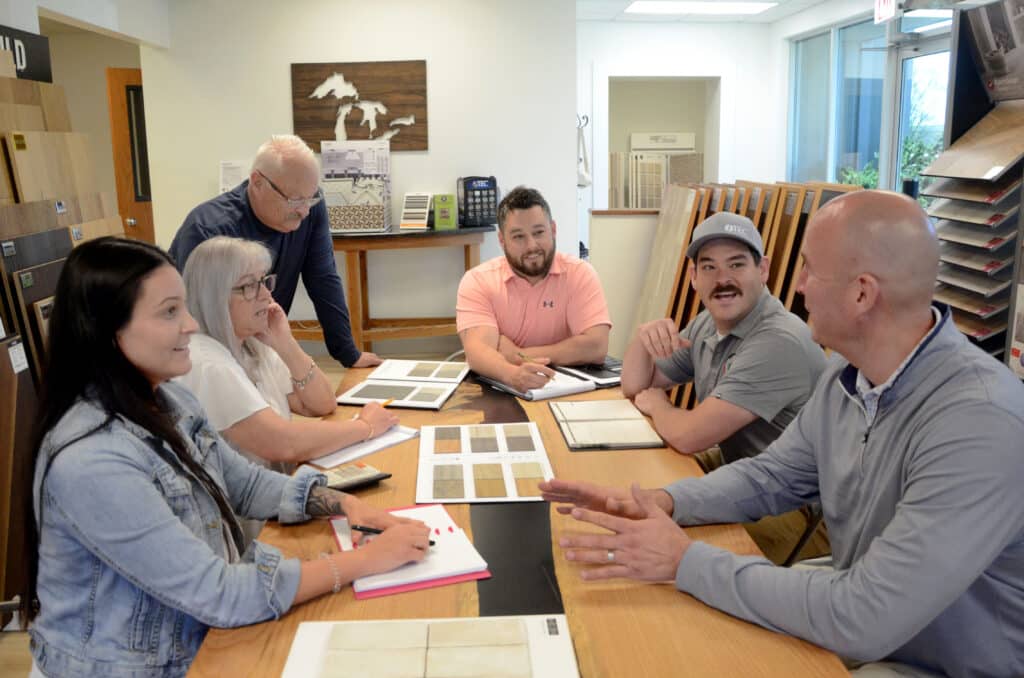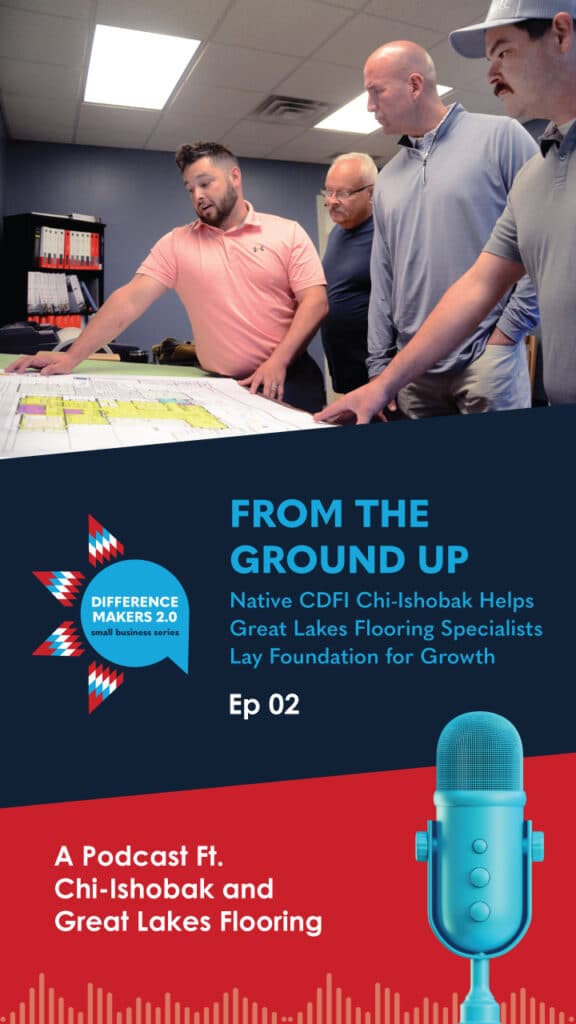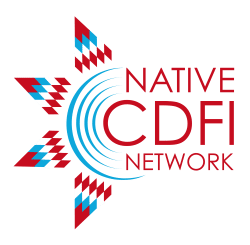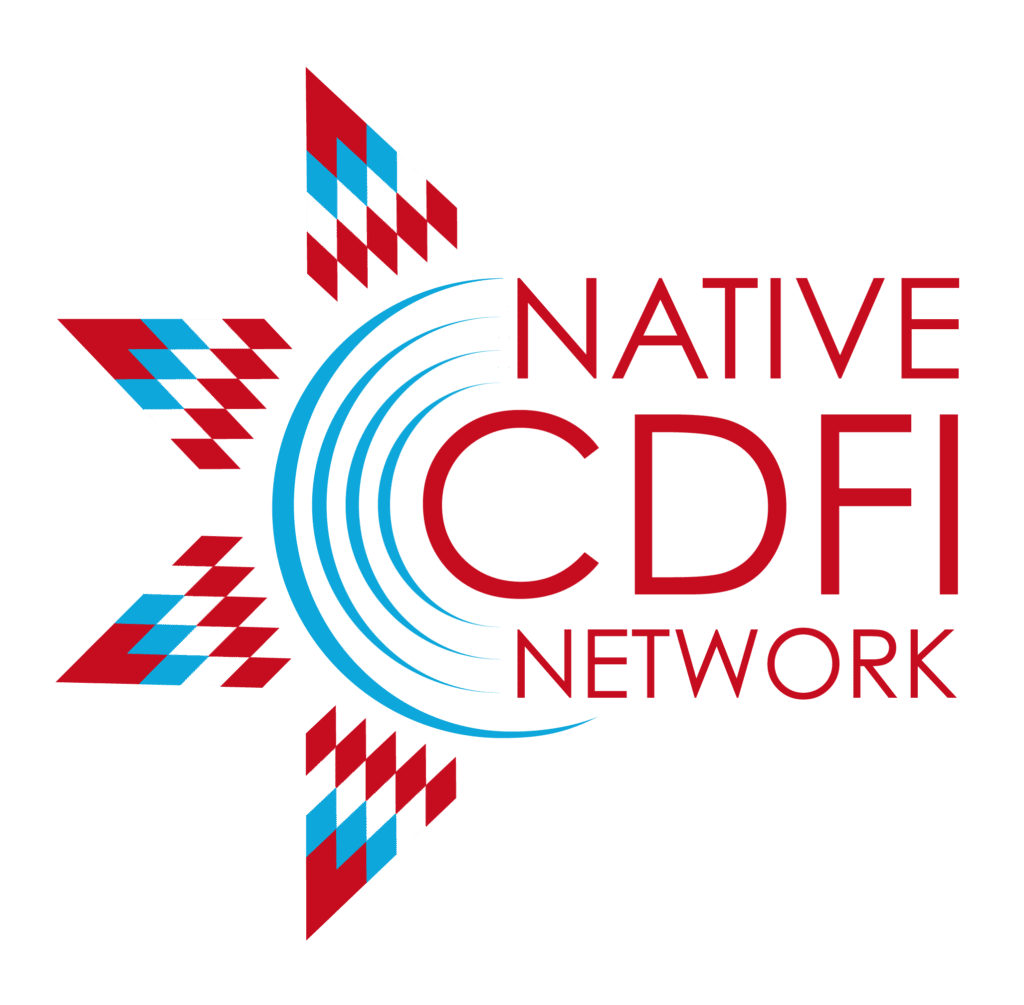Wayne Roberts, a citizen of the Sioux St. Marie Tribe of Chippewa Indians, had been installing commercial flooring for 35 years when he had the opportunity to start his own flooring business in 2015.
His first client, a hospital in southwest Michigan, was familiar with the quality of Wayne’s work — so much so that they gave him funds upfront to purchase the supplies he needed to complete the job.
With that first job came many more. The business soon became Great Lakes Flooring Specialists Inc. and grew into a family affair, with Wayne’s wife, Julie, and his three children, Meagan, Jordan, and Justin, all pitching in.
With each job — as is standard in the commercial flooring industry — Great Lakes Flooring had to pay upfront for supplies before completing a job, with payment coming 40-60 days after billing. For large commercial jobs, those upfront costs could run upwards of $100,000.
“Our cash flow couldn’t support our growth,” Meagan said. “And that’s when we knew we needed help.”

The Roberts family had used the Pokagon Band of Potawatomi Health Services in southwest Michigan and had heard of the tribe’s community development financial institution (CDFI), Chi-Ishobak. The Native CDFI serves citizens of federally recognized tribes in Michigan with personal and commercial lending products and technical assistance.
Meagan said Chi-Ishobak embraced the family-owned business right away.
“They looked out for us from the very beginning,” Meagan said. “Immediately, they connected us with a financial specialist to make sure we had all of the tools we needed beyond lending.”
Chi-Ishobak was officially founded in 2009, and began lending in 2012. To date, the CDFI has closed some 1,224 loans — including 80 commercial small business loans — to the tune of $17 million.
Executive Director Sean Winters describes the Chi-Ishobak’s evaluation of potential borrowers as “less invasive” than traditional banks. Borrowers are evaluated not just on their ability to pay, but also on their willingness to pay.
“Our whole mission includes responsible lending, and we also want to create an enjoyable experience for our tribal citizens,” Winters said. “That willingness component has allowed us to be a little bit more alert when we are going through our applications.”
In addition to issuing Great Lakes Flooring a $50,000 line of credit to help fill the cash flow gaps between ordering supplies and receiving full payment, Chi-Ishobak gave the Roberts family technical assistance to grow their business acumen.
“They were able to give us knowledge, not just capital,” Jordan said. “They provided coaching and support and helped us figure out what we were doing wrong and what we were doing right. We would not have gotten far without them.”
As the company continued to grow, the CDFI continued to provide Great Lakes Flooring with credit facilities to meet their working capital needs, as well as business coaching.
In 2020, Great Lakes Flooring had an opportunity to buy the warehouse they had been leasing for several years. Chi-Ishobak issued them a $300,000 loan to purchase the building — the first commercial loan of that size, according to Winters.
As Winters got to know the Roberts family, he witnessed their level of commitment to building a sound business. Supporting their growth was a “no-brainer” according to Winters.
“The way they operate as a family is unique and outstanding, and that carries over into the way they operate as a business,” Winters said. “Seeing how committed they are to doing things the right way and to build a reputation to get to where they are now.”

In 2020, the company installed the floor at the Pokagon Health Center and the tribal court. Meagan said the job was a full-circle moment.
“We were so excited to be a part of that,” she said.
“In our culture and community, the circle is really resonant of balance and equity,” Winters said. “It’s been so neat to see Great Lakes Flooring mature and grow as a family and a business. Beyond all of the revenue and more jobs, they are so confident as business owners now. To see that — and for us at Chi-Ishobak to be a part of that — is really special.”
Difference Makers 2.0 is a new yearlong series that highlights how Native community development financial institutions (CDFIs) work alongside their small business clients to accelerate change and create economic opportunities in Native communities. Join the Native CDFI Network and Tribal Business News as they shine a spotlight on the people accelerating economic change in Indian Country. Read the stories here and be sure to tune into the Difference Makers 2.0 podcast.

